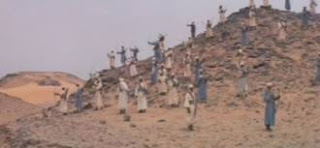
Battle of Uhud
The attack at Badr committed Muhammad(saw) to total war with Meccans, who were now anxious to avenge their defeat. To maintain their economic prosperity, the Meccans needed to restore their prestige, which had been lost at Badr.[122] In the ensuing months, Muhammad(saw) led expeditions on tribes allied with Mecca and sent out a raid on a Meccan caravan.[123] Abu Sufyan subsequently gathered an army of three thousand men and set out for an attack on Medina.[124]
A scout alerted Muhammad(saw) of the Meccan army's presence and numbers a day later. The next morning, at the Muslim conference of war, there was dispute over how best to repel the Meccans. Muhammad(saw) and many senior figures suggested that it would be safer to fight within Medina and take advantage of its heavily fortified strongholds. Younger Muslims argued that the Meccans were destroying their crops, and that huddling in the strongholds would destroy Muslim prestige. Muhammad(saw) eventually conceded to the wishes of the latter, and readied the Muslim force for battle. Thus, Muhammad(saw) led his force outside to the mountain of Uhud (where the Meccans had camped) and fought the Battle of Uhud on March 23.[125][126] Although the Muslim army had the best of the early encounters, indiscipline on the part of strategically placed archers led to a Muslim defeat, with 75 Muslims killed including Hamza, Muhammad(saw)'s uncle and one of the best known martyrs in the Muslim tradition. The Meccans did not pursue the Muslims further, but marched back to Mecca declaring victory. They were not entirely successful, however, as they had failed to achieve their aim of completely destroying the Muslims.[127][128] The Muslims buried the dead, and returned to Medina that evening. Questions accumulated as to the reasons for the loss, and Muhammad(saw) subsequently delivered Qur'anic verses 3:152 which indicated that their defeat was partly a punishment for disobedience and partly a test for steadfastness.[129]
Abu Sufyan now directed his efforts towards another attack on Medina. He attracted the support of nomadic tribes to the north and east of Medina, using propaganda about Muhammad(saw)'s weakness, promises of booty, memories of the prestige of the Quraysh and use of bribes.[130] Muhammad(saw)'s policy was now to prevent alliances against him as much as he could. Whenever alliances of tribesmen against Medina were formed, he sent out an expedition to break them up.[130] When Muhammad(saw) heard of men massing with hostile intentions against Medina, he reacted with severity.[131] One example is the assassination of Ka'b ibn al-Ashraf, a chieftain of the Jewish tribe of Banu Nadir who had gone to Mecca and written poems that helped rouse the Meccans' grief, anger and desire for revenge after the Battle of Badr.[132] Around a year later, Muhammad(saw) expelled the Banu Nadir from Medina.[133] Muhammad(saw)'s attempts to prevent formation of a confederation against him were unsuccessful, though he was able to increase his own forces and stop many potential tribes from joining his enemies.[134]
No comments:
Post a Comment